![]()

Ramona (1916)
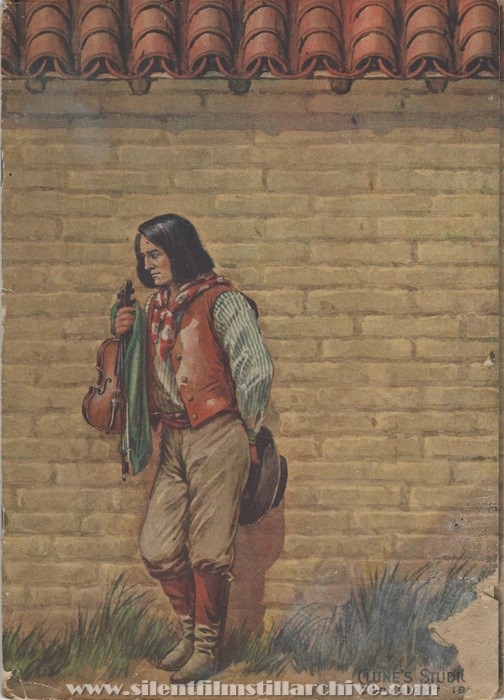
CLUNE'S STUDIO
Copyright 1916
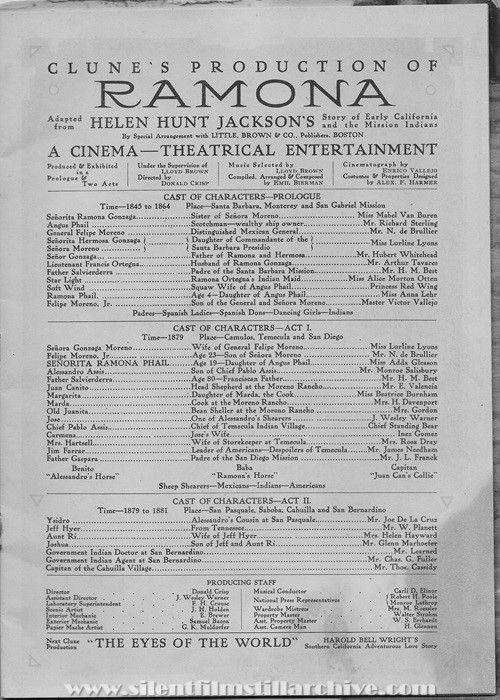
CLUNE'S PRODUCTION OF
RAMONA
Adapted from HELEN HUNT JACKSON'S Story of Early
California and the Mission Indians
By Special Arrangement with
LITTLE, BROWN & CO., Publishers, BOSTON
A CINEMA -- THEATRICAL ENTERTAINMENT
Produced and Exhibited in a Prologue of Two Acts
Under the Supervision of LLOYD BROWN
Directe by DONALD CRISP
Music
Selected by LLOYD BROWN
Compiled, Arranged & Composed by EMIL BIERMAN
Cinematography by ENRICO VELLEJO
Costumes & Properties Designed by
ALEX F. HARMER
CAST OF CHARACTERS -- PROLOGUE
Time - 1845 to 1864
Place - Santa Barbara, Monterey and San Gabriel Mission
| Señorita Ramona Gonzaga | Sister of Señora Moreno | Miss Mabel Van Buren |
| Angus Phail | Scotchman - wealthy ship owner | Mr. Richard Sterling |
| General Felipe Moreno | Distinguished Mexican General | Mr. N. (Nigel) de Brullier |
| Señorita Hermosa Gonzaga / Señora Moreno | Daughter of the Commandante of the Santa Barbara Persidio | Miss Lurline Lyons |
| Señor Gonzaga | Father of Ramona and Hermosa | Mr. Hubert Whitehead |
| Lieutenant Francis Ortegna | Husband of Ramona Gonzaga | Mr. Arthur Tavares |
| Father Salvierderra | Padre of the Santa Barbara Mission | Mr. H. M. Best |
| Star Light | Ramona Ortegna's Indian Maid | Miss Alica Morton Otten |
| Soft Wind | Squaw Wife of Angus Phail | Princess Red Wing |
| Ramona Phail | Age 4 - Daughter of Angus Phail | Miss Anna Lehr |
| Felipe Moreno, Jr. | Son of the General and Señora Moreno | Master Victor Vallejo |
Padres -- Spanish Ladies -- Spanish Dons -- Dancing Girls -- Indians
CAST OF CHARACTERS -- ACT I.
Time - 1879
Place - Camulos, Temecula and San Diego
| Señora Gonzaga Moreno | Wife of General Felip Moreno | Miss Lurline Lyons |
| Felipe Moreno, Jr. | Age 23 - Son of Seņora Moreno | Mr. N. de Brullier |
| SEÑORITA RAMONA PHAIL | Age 19 - Daughter of Angus Phail | Miss Adda Gleason |
| Alessandro Assis | Son of Chief Pablo Assis | Mr. Monroe Salisbury |
| Father Salvierderra | Age 80 - Franciscan Father | Mr. H. M. Best |
| Juan Canito | Head Shepherd at the Moreno Rancho | Mr. E. Valencia |
| Margarita | Daughter of Marda, the Cook | Miss Bearice Burnham |
| Marda | Cook at the Moreno Rancho | Mrs. H. Davenport |
| Old Juanita | Bean Sheller at the Moreno Rancho | Mrs. Gordon |
| Jose | One of Alessandro's Shearers | J. Wesley Warner |
| Chief Pablo Assis | Chief of the Temecula Indian Village | Chief Standing Bear |
| Carmena | Jose's Wife | Inez Gomez |
| Mrs. Hartsell | Wife of Storekeeper at Temecula | Mrs. Rosa Dray |
| Jim Farrar | Leader of Americans - Despoilers of Temecula | Mr. James Needham |
| Father Gaspara | Padre of the San Diego Mission | Mr. J. L. Franck |
Benito "Alessandro's Horse"
Baba "Ramona's Horse"
Capitan "Juan Can's Collie"
Sheep Shearers -- Mexicans -- Indians --
Americans
CAST OF CHARACTERS -- ACT II.
Time - 1879 to 1881
Place - San Pasquale, Saboba, Cahuilla and San Bernardino
| Ysidro | Alessandro's Cousin at San Pasquale | Mr. Joe De La Cruz |
| Jeff Hyer | From Tennessee | Mr. W. Planett |
| Aunt Ri | Wife of Jeff Hyer | Mrs. Helen Hayward |
| Joshua | Sone of Jeff and Aunt Ri | Mr. Glenn Marhoefer |
| Government Indian Doctor at San Bernardino | Mr. Learned | |
| Government Indian Agent at San Bernardino | Mr. Chas. G. Fuller | |
| Captain of the Cahuilla Village | Mr. Thos Cassidy |
PRODUCING STAFF
| Director | Donald Crisp |
| Assistant Director | J. Wesley Warner |
| Laboratory Superintendent | F. H. Crouse |
| Scenic Artist | J. H. Holden |
| Interior Mechanic | E. Brewer |
| Exterior Mechanic | Samuel Bacon |
| Paper Mache Artist | G. K. Muldorfer |
| Musical Conductor | Cari D. Elinor |
| National Press Representatives | Robert H. Poole |
| Monroe Lathrop | |
| Wardrobe Mistress | Mrs. M. Roessler |
| Property Master | Walter Strohm |
| Asst. Property Master | W. S. Errhardt |
| Asst. Camera Man | H. Glennon |
Next Clune Production "THE EYES OF THE WORLD"
HAROLD BELL WRIGHT'S Southern California Adventurous Love Story
When Anna Lehr grew up she changed her name to Ann Dvorak as an adult actress. -- Bruce
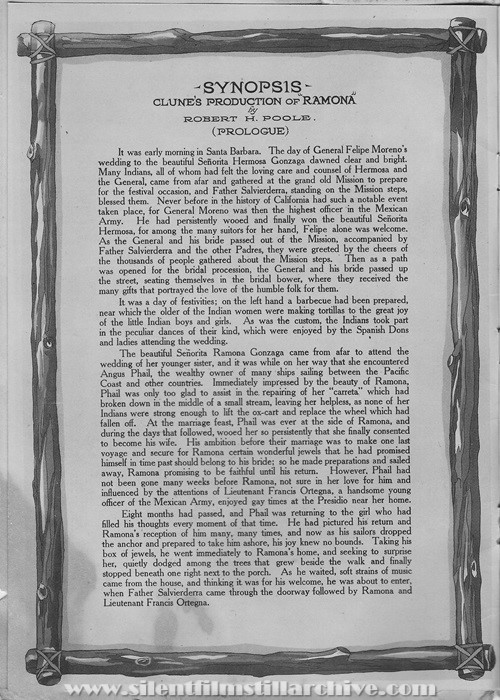
SYNOPSIS
CLUNE'S PRODUCTION OF "RAMONA"
by
ROBERT H. POOLE
(PROLOGUE)
It was early morning in Santa Barbara. The day of General Felipe Moreno's wedding to the beautiful Señorita Hermosa Gonzaga dawned clear and bright. Many Indians, all of whom had felt the loving care and counsel of Hermosa and the General, came from afar and gathered at the grand old Mission to prepare for the festival occasion, and Father Salvierderra, standing on the Mission steps, blessed them. Never before in the history of California had such a notable event taken place, for General Moreno was then the highest officer in the Mexican Army. He had persistently wooed and finally won the beautiful Seņorita Hermosa, for among the many suitors for her hand, Felipe alone was welcome. As the General and his bride passed out of the Mission, accompanied by Father Salvierderra and the other Padres, they were greeted by the cheer of the thousands of people gathered about the Mission steps. Then as a path was opened for the bridal procession, the General and his bride passed up the street, seating themselves in the bridal bower, where they received the many gifts that protrayed the love of the humble folk for them.
It was a day of festivities; on the left hand a barbecue had been prepared, near which the older of the Indian women were making tortillas to the great joy of the little Indian boys and girls. As was the custom, the Indians took part in the peculiar dances of their kind, which were enjoyed by the Spanish Dons and ladies attending the wedding.
The beautiful Seņorita Ramona Gonzaga came from afar to attend the wedding of her younger sister, and it was while on her way that she encountered Angus Phail, the wealthy owner of many ships sailing between the Pacific Coast and other countries. Immediately impressed by the beauty of Ramona, Phail was only too glad to assist in the repairing of her "carreta" which had broken down in the middle of a small stream, leaving her helpless, as none of her Indians were strong enough to lift the ox-cart and replace the wheel which had fallen off. At the marriage feast, Phail was ever at the side of Ramona, and during the days that followed, wooed her so persistently that she finally consented to become his wife. His ambition before their marriage was to make one last voyage and secure for Ramona certain wonderful jewels that he had promised himself in time past should belong to his bride; so he made preparations and sailed away, Ramona promising to be faithful until his return. However, Phail had not been gone many weeks before Ramona, not sure in her love for him and influenced by the attentions of Lieutenant Francis Ortegna, a handsome young officer of the Mexican Army, enjoyed gay times at the Presidio near her home.
Eight months had passed, and Phail was returning to the girl who had filled his thoughts every moment of that time. He had pictured his return and Romona's reception of him many, many times, and now as his sailor dropped the anchor and prepared to take him ashore, his joy knew no bounds. Taking his box of jewels, he went immediately to Ramona's home, and seeking to suprise her, quietly dodged among the trees that grew beside the walk and finally stopped beneath one right next to the porch. As he waited, soft strains of music came from the house, and thinking itwas for his welcome, he was about to enter, when Father Salvierderra came through the doorway followed by Ramona and Lieutenant Francis Ortegna.
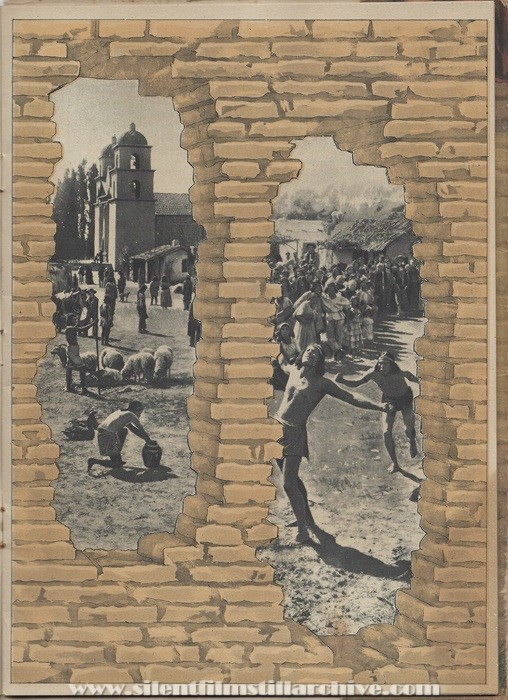
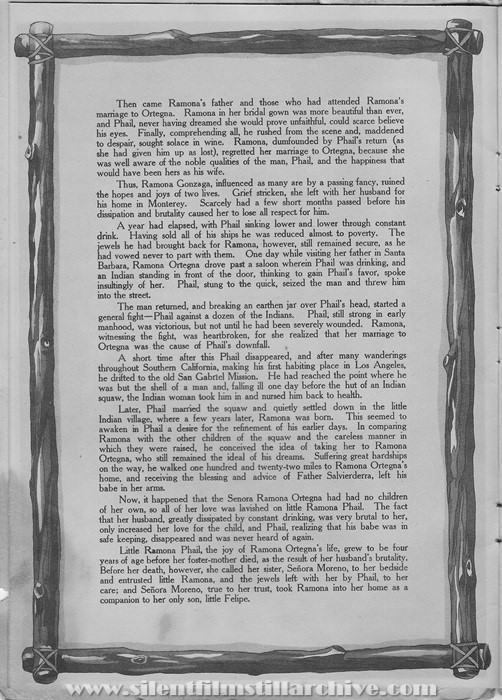
Then came Ramona's father and those who had attended Ramona's marriage to Ortegna. Ramona in her bridal gown was more beautiful than ever, and Phail, never having dreamed she would prove unfaithful, could scarce believe his eyes. Finally, comprehanding all, he rushed from the scene and, maddened to despair, sought solace in wine. Ramona, dumfounded by Phail's return (as she had given him up as lost), regretted her marriage to Ortegna, because shw was well aware of the noble qualities of the man, Phail, and the happiness that would have been hers as his wife.
Thus, Ramona Gonzaga, influenced as manyare by a passing fancy, ruined the hopes and joys of two lives. Grief stricken, she left with her husband for his home in Monterey. Scarcely had a few short month passed before his dissipation and brutality caused her to lost all respect for him.
A year had elapsed, with Phail sinking lower and lower through constant drink. Having sold all of his ships he was reduced almost to poverty. The jewels he had brought back for Ramona, however, still remained secure, as he had vowed never to part with them. One day while visiting her father in Santa Barbara, Ramona Ortegna drove past a saloon wherein Phail was drinking, and an Indian standing in front of the door, thinking to gain Phail's favor, spoke insultingly of her. Phail, stund to the quick, seized the man and threw him into the street.
The man returned, and breaking an earthen jar of Phail's head, started a general fight -- Phail against a dozen of the Indians. Phail, still strong in early manhood, was ictorious, but not until he had been severely wounded. Ramona, witnessing the fight, was heartbroken, for she realized that her marriage to Ortegna was the cause of Phail's downfall.
A short time after this Phail disappeared, and after many wanderings throught Southern California, making his first habiting place in Los Angeles, he drifted to the old San Gabriel Mission, He had reached the point where he was but the shell of a man and, falling ill one day before the hut of an Indian squaw, the Indian woman took him in and nursed him back to health.
Later, Phail married the squaw and quietly settled down in the little Indian village, were a few years later, Ramona was born. This seemed to awaken in Phail a desire for the refinement of his earlier days. In comparing Ramona with the other children of the squaw and the careless manner in which they were raised, he conceived the idea of taking her to Ramona Ortegna, who still remained the ideal of his dreams. Suffering great hardships on the way, he walked one hundred and twenty-two miles to Ramona Ortegna's home, and receiving the blessing and advice of Father Salvierderra, left his babe in her arms.
Now, it happened that the Senora Ramona Ortegna had had no children of her own, so all of her love was lavished on little Ramona Phail. The fact that her husband, greatly dissipated by constant drinking, was very brutal to her, only increased her love for the child, and Phail, realizing that his babe was in safe keeping disappeared and was never heard of again.
Little Ramona Phail, the joy of Ramona Ortegna's life, grew to be four years of age before her faster-mother died, as the result of her husband's brutality. Before he death, however, she called her sister, Señora Moreno, to her bedside and entrusted little Ramona, and the jewels left with her by Phail, to her care; and Seņora Moreno, true to her trust, took Ramona into her home as a companion to her only son, little Felipe.
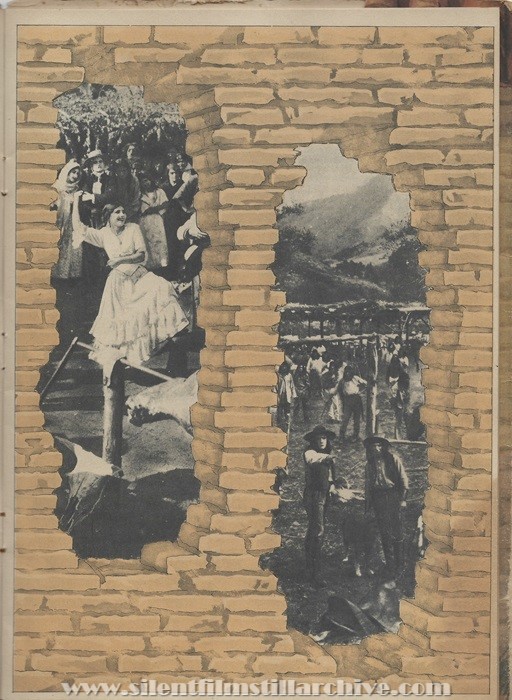
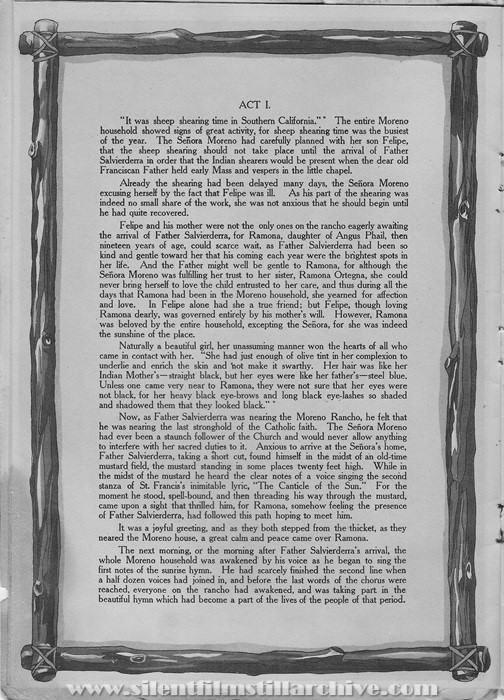
ACT I.
"It was sheep shearing time in Southern California,"* The entire Moreno household showed signs of great activity, for sheep shearing time was the busiest of the year. The Señora Moreno had carefully planned with her sone Felipe, that the sheep shearing should not take place until the arrival of Father Salvierderra in order that the Indian shearers would b epresent when the dear old Franciscan Father held early Mass and vespers in the little chapel.
Already the shearing had been delayed many days, the Seņora Moreno excusing herself by the fact that Felipe was ill. As his part of the shearing was indeed no small share of the work, she was not anxious that he should begin until he had quite recovered.
Felipe and his mother were not the only ones on the rancho eagerly awaiting the arrival of Father Salvierderra, for Ramona, daughter of Angus Phail, then nineteen years of age, could scarce wait, as Father Salvierderra had been so kind and gentle toward her that hs coming each year were the brightest spots in her life. And the Father might well be gentle to Ramona, for although the Seņnora Moreno was fulfilling her trust to her sister, Ramona Ortegna, she could never bring herself to love the child entrusted to her care, and thus during all the days that Ramona had been in the Moreno household, she yearned for affection and love. In Felipe alone had she a true friend; but Felipe, though loving Ramona dearly, was governed entirely by his mother's will. However, Ramona has beloved by the entire household, excepting the Seņora, for she was indeed the sunshine of the place.
Naturally a beautiful girl, her unassuming manner won the hearts of all who came in contact with her. "She had just enough of olive tint in her complexion to underlie and enrich the skin and not make it swarthy. Her hair was like her Indian Mother's -- straight black, but her eyes were like her father's -- steel blue. Unless one came very near to Ramona, they were not sure that her eyes were not black, for her heavy black eye-brows and long black eye-lashes so shaded and shadowed them that they looked black."*
Now, as Father Salvierderra was nearing the Moreno Rancho, he felt that he was nearing the last stronghold of the Catholic faith. The Seņora Moreno had ever been a staunch follower of the Church and would never allow anything to interfere with her sacred duties to it. Anxious to arrive at the Seņora's home, Father Salvierderra, taking a short cut, found himself in the midst of an old-time mustard field, the mustard standing in some places twenty feet high. While in the midst of the mustard he heard the clear notes of a voice singing the second stanza of St. Francis's inimitable lyric, "The Canticle of the Sun." For the moment he stood, spell-bound, and then threading his way through the mustard, came upon a sight that thrilled him, for Ramona, somehow feeling the presence of Father Salvierderra, had followed his path hoping to meet him.
It was a joyful greeting, and as they both stepped from the thicket, as they neared the Moreno house, a great calm and peace came over Ramona.
The next morning, or the morning after Father Salvierderra's arrival, the whole Moreno household was awakened by his voice as he began to sing the first notes of the sunrise hymn. He had scarcely finished the second line when a half dozen voices had joined in, and before the last words of the chorus were reached, everyone on the rancho had awakened, and was taking part in the beautiful hymn which had become a part of the lives of the people of that period.
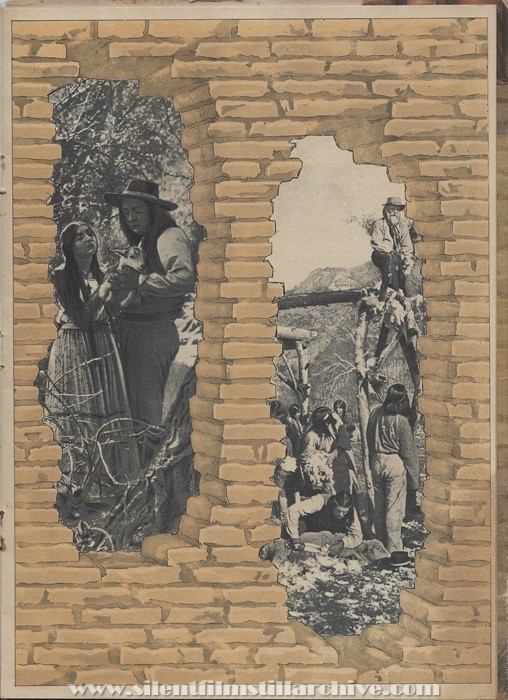
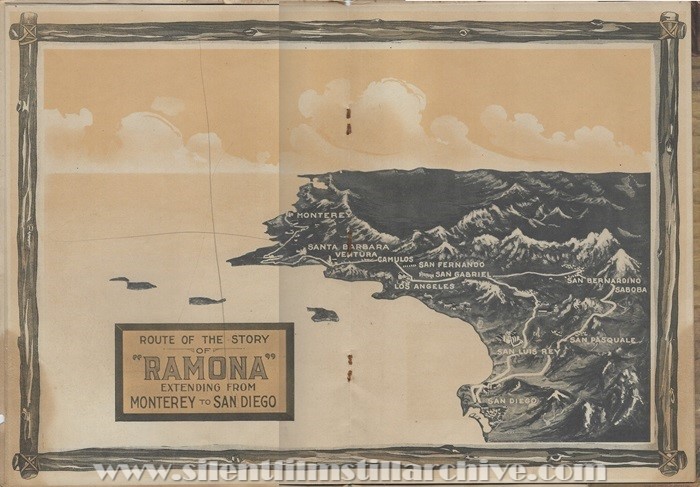
ROUTE OF THE STORY OF
"RAMONA"
EXTENDING FROM MONTEREY to SAN
DIEGO
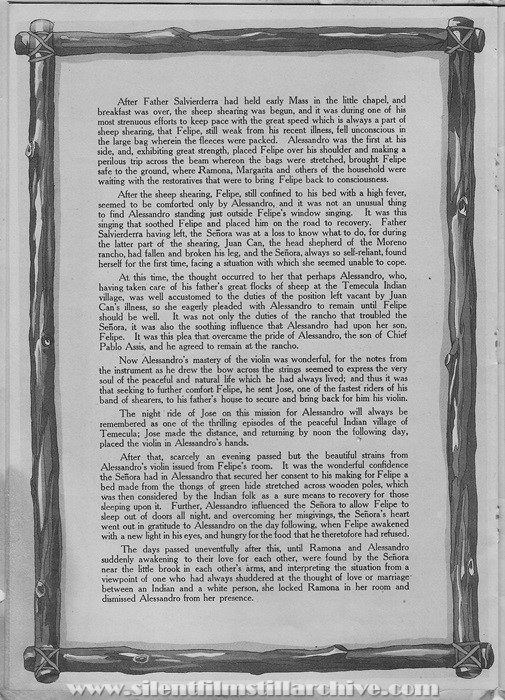
After Father Salvierderra had held early Mass in the little chapel, and breakfast was over, the sheep shearing was begun, and it was during one of his most strenuous effort to keep pace with the great speed which is always a part of sheep shearing, that Felipe, still weak from his recent illness, fell unconscious in the large bag wherein the fleeces were packed. Alessandro was the first at his side, and, exhibiting great strength, placed Felipe over his should and makeing perilous trip across the beam whereon the bags were stretched, brought Felipe safe to the ground, where Ramona, Margarita and others of the household were waiting with the restoratives that were to bring Felipe back to consciousness.
After the sheep shearing, Felipe, still confined to his bed with a high fever, seemed to be comforted only by Alessandro, and it was not an unusual thing to find Alessandro standing just outside Felipe's window singing. It was this singing that soothed Felipe and place him on the road to recovery. Father Salvierderra having left, the Seņora was at a loss to know what to do, for during the latter part of the shearing, Juan Can, the head shepherd of the Moreno rancho, had fallen and broken his leg, and the Seņora, always so self-reliant, found herself for the first time, facing a situation with which she seemed unable to cope.
At this time, the though occurred to her that perhaps Alessandro, who, having taken care of his father's great flocks of sheep at the temecula Indian village, was well accustomed to the duties of the positionleft vacant by Juan Can's illness, so she eagerly pleaded with Alessandro to remain until Felipe should be well. It was not aonly the duties of the rancho that troubled the Seņora, it was also the soothing influence that Alessandro had upon her son, Felipe. It was this plea that overcame the pride of Alessandro, the son of Chief Pablo Assis, and he agreed to remain at the rancho.
New Alessandro's mastery of the violin was wonderful, for the notes from the instrument as he drew the bow across the strings seemed to express the very sould of the peaceful and natural life which he had always lived; and thus it was that seeking to further comfort Felipe, he sent Jose, one of the fastest riders of his band of shearers, to his father's house to secure and bring back for him his violin.
The night ride of Jose on this mission for Alessandro will always be remenbered as one of the thrilling episodes of the peaceful Indian village of Temecula; Jose made the distance, and returning by noon the following day, placed the violin in Alessandro's hands.
After that, scarcely an evening passed but the beautiful strains from Alessandro's violin issued from Felipe's room It was the wonderful confidence the Seņora had in Alessandro that secured her consent to his making for Felipe a bed made from the thongs of green hide stretched across wooden poles, which was then considered by the Indian folk as a sure means to recovery for those sleeping upon it. Further, Alessandro influenced the Seņora to allow Felipe to sleep out of doors all night, and overcoming her misgivings, the Seņora's heart went out in gratitude to Alessandro on the day following, when Felipe awakened with a new light in his eyes, and hungry for the food that he theretofore had refused.
The days passed uneventfully after this, until Ramona and Alessandro suddenly awakening to their love for each other, were found by the Seņora near the little brook in each other's arms, and interpreting the situation from a viewpoint of one who had always shuddered at the though of love or marriage between an Indian and a white person, she locked Ramona in her room and dismissed Alessandro from her presence.
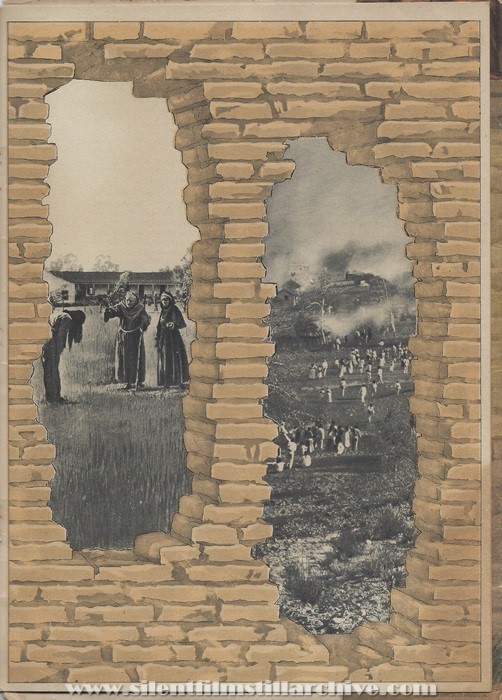
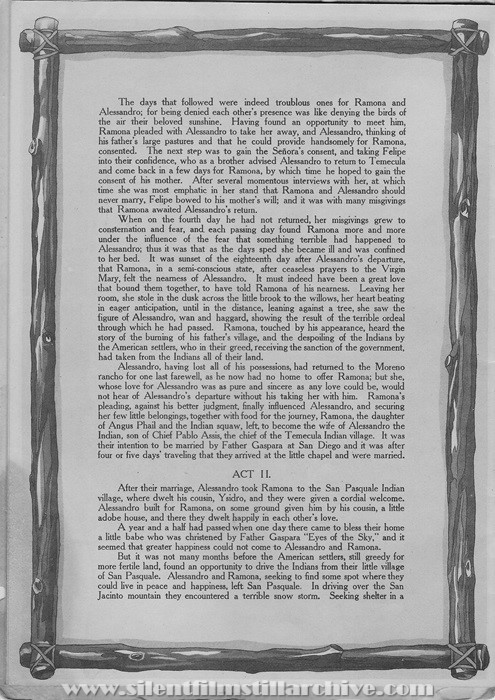
The days that followed were indeed troublous one for Ramona and Alessandro; for being denied each other's presence was like denying the birds of the air their beloved sunshine. Having found an opportunity to meet hi, Ramona pleaded with Alessandro to take her away, and Alessandro, thinking of his father's large pastures and that he could provide handsomely for Ramona, consented. The next step was to gain the Seņora's consent, and taking Felipe into their confidence, who as a brother advised Alessandro to return to Temecula and come back in a few days for Ramona, by which time he hoped to gain the consent of his mother. After several momentous interview with her, at which time she was most emphatic in her stand that Ramona and Alessandro should never marry, Felipe bowed to his mother's will; and it was with man misgivings that Ramona awaited Alessandro's return.
When on the fourth day had had not returned, her misgivings grew to consternation and fear, and each passing day found Ramona more and more under the influence of the fear that something terrible had happened to Alessandro; thus it was that as the days sped she became ill and was confined to her bed. It was sunset of the eighteenth day after Alessandro's departure, that Ramona, in a semi-conscious state, after ceaseless prayers to the Virgin Mary, felt the nearness of Alessandro. It must indeed have been a great love that bound them together, to have told Ramona of his nearness. Leaving her room, she stole in the dusk across the little brook to the willows, her heart-beating in eager anticipation, until in the distance, leaning against a tree, she saw the figure of Alessandro, wan and haggard, shwing the result of the terrible ordeal whough which he had passed. Ramona, touched by his appearance, heard the story of the burning of his father's village, and the despoiling of the Indians by the American settler, who in their greed, receiving the sanction of the government, had take from the Indians all of their land.
Alessandro, having lost all of his possessions, had returne to the Moreno rancho for one last farewell, as he now had no home to offer Ramona; but she, whose love for Alessandro was as pure and sincere as any love could be, would not hear of Alessandro's departure without his taking her with him. Ramona's pleading, against his better judgement, finally incluenced Alessandro, and securing her few little belingings, together with food for the journey, Ramona, the daughter of Angus Phail and the Inaidn squaw, left, to become the wife of Alessandro the Indian, sone of Chief Pable Assis, the chief of the Temecula Indian village. It was their intention to be married by Father Gaspara at San Diego and it was after four or five days' traveling that they arrived at the little chapel and were married.
ACT II.
After their marriage, Alessandro took Ramona to the San Pasquale Indian village, where dwelt his cousin, Ysidro, and they were given a cordial welcome. Alessandro built for Ramona, on some ground given him by his cousin, a little adobe house, and there they dwelt happily in each other's love.
A year and a half had passed when one day there came to bless their home a little babe who was christened by Father Gaspara "Eyes of the Sky," and it seemed that greater happiness could not come to Alessandro and Ramona.
But it was not many months before the American settlers, still greedy for more fertile land, found an opportunity to drive the Indians from their little village of San Pasquale. Alessandro and Ramona, seeking to find some spot where they could live in peace and happiness, left San Pasquale. In driving of the San Jacinto mountain they encountered a terrible snow storm. Seeking shelter in a
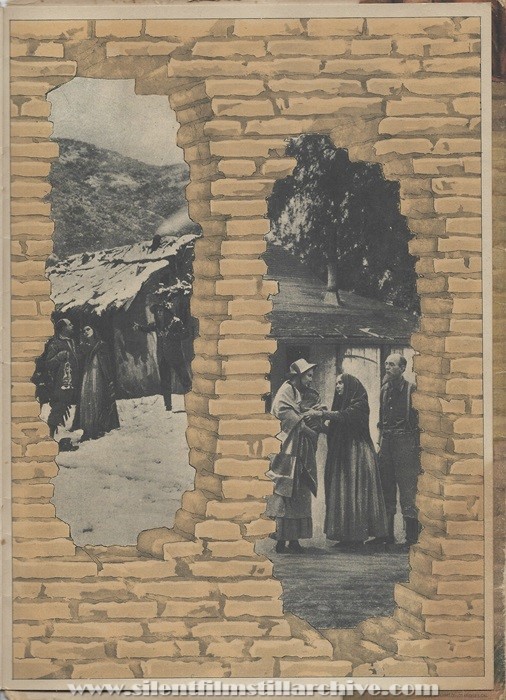
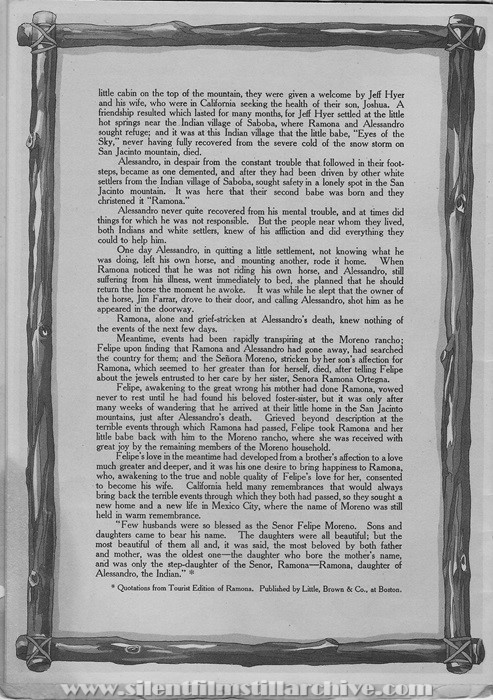
little cabin on top of the mountain, they were given a welcome by Jeff Hyer and his wife, who were in California seeking the health of their son, Joshua. A friendship resulted which lasted for many months, for Jeff Hyer settled at the little hot springs near the Indian village of Saboba, where Ramona and Alessandro sought refuge; and it was at this Indian village that the little babe, "Eyes of the Sky," never having fully recovered from the severe cold of the snow storm on San Jacinto mountain, died.
Alessandro, in despair from the constant trouble that followed in their footsteps, became as one demented, and after they had been driven by other white settles from the Indian village of Saboba, sought safety in a lonely spot in the San Jacinto mountain. It was here that their second babe was born and they christened it "Ramona."
Alessandro never quite recovered from his mental trouble, and at times did things for which he was not responsible. But the people near whom they lived, both Indians and white settlers, knew of his affliction and did everything they could to help him.
One day Alessandro, in quitting a little settlement, not knowing what he was doing, left his own horse, and mounting another, rode it home. When Ramona noticed that he was not riding his own horse, and Alessandro, still suffering from his illnes, went immediately to bed, she planned that he should return the horse the moment he awoke. It was while he slept that the owner of the horse, Jim Farrar, drove to their door, and calling Alessandro, shot him as he appeared in the doorway.
Ramona, alone and grief-stricken at Alessandro's death, knew nothing of the events of the next few days.
Meantime, events had been rapidly transpiring at the Moreno rancho; Felipe upon finding that Ramona and Alessandro had gone away, had searched the country for them; and the Señora Moreno, stricken by her son's affection for Ramona, which seemed to her greater than for herself, died after telling Felipe about the jewels entrusted to her care by her sister, Seņ Ramona Ortegna.
Felipe, awakening to the great wrong his mother had done Ramona, vowed never to rest until he had found his beloved foster-sister, but it was only after many weeks of wandering that he arrived at their little home in the San Jacinto mountains, just after Alessandro's death. Grieved beyond description at the terrible events through which Ramona had passed, Felipe took Ramona and her little babe back with him to the Moreno rancho, where she was received with great joy by the remaining members of the Moreno household.
Felipe's love in the meantime had developed from a brother's affection to a love much greater and deeper, and it was his one desire to bring happiness to Ramona, who, awakening to the rue and noble quality of Felipe's love for her, consented to become his wife. California held many remembrances that would always bring back the terrible events through which they both had passed, so theysought a new home and a new life in Mexico City, where the name of Moreno was still held in warm remembrance.
"Few husbands were so blessed as the Senor Felipe Moreno. Sons and daughters came to bear his name. The daughters were all beautiful; but the most beautiful of them all and, it was said, the most beloved by both father and mother, was the oldest one -- the daughter who bore the mother's name, and was only the step-daughter of the Senor, Ramona -- Ramona, daughter of Alessandro, the Indian." *
* Quotations from Tourist Edition of Ramona. Published by Little, Brown & Co., at Boston.
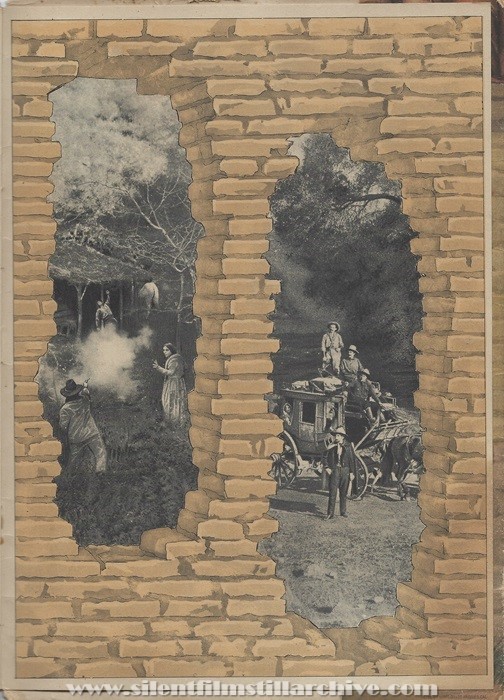
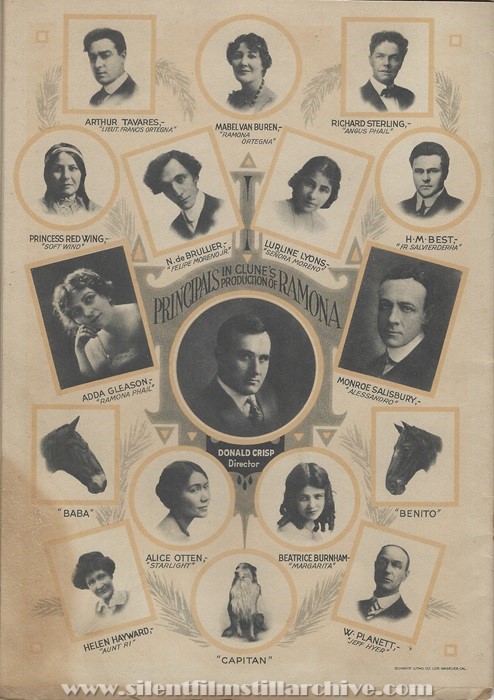
PRINCIPALS in CLUNE's PRODUCTION of RAMONA
ARTHUR TAVARES - "Lieut. Francis Ortegna"
MABEL VAN BUREN - "Ramona
Ortegna"
RICHARD STERLING - "Angus Phail"
"PRINCESS RED WING -
"Soft Wind"
N. (Nigel) de BRULLIER - "Felipe Moreno Jr."
LURLINE
LYONS - "SEÑORA MORENO"
H. M. BEST - "Fr. Salvierderra"
ADDA GLEASON - "Ramona Phail"
MONROE SALISBURY - "Alessandro"
DONALD CRISP - Director
"BABA"
ALICE OTTEN - "Starlight
BEATRICE BURNHAM- "Magarita"
"BENITO"
HELEN HAYWARD - "Aunt Ri"
CAPTAIN"
W. PLANETT - Jeff Hyer"
Schmidt Litho Co., Los Angeles Cal.
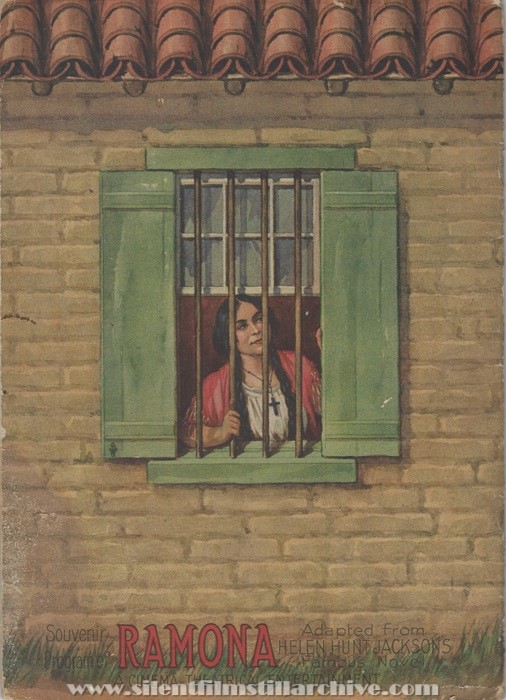
Souvenir Programme
RAMONA
Adapted from HELEN HUNT
JACKSON'S
Famous Novel
A Cinema-Theatrical Entertainment
with Adda Gleason, Monroe Salisbury, and Mabel Van Buren. Directed by Donald Crisp. Clune Film Producing Company.
More Information on this film...

This work (Ramona (1916), by
Clune Film Producing Company), identified by
Bruce Calvert, is free of known copyright
restrictions.
Books
(none)
Last Modified January 15, 2024



















